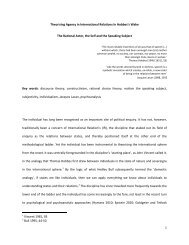2014 STUDENT GUIDE - The University of Sydney
2014 STUDENT GUIDE - The University of Sydney
2014 STUDENT GUIDE - The University of Sydney
Create successful ePaper yourself
Turn your PDF publications into a flip-book with our unique Google optimized e-Paper software.
STUDIES IN RELIGION<br />
UNDERGRADUATE PROGRAM<br />
Studies in Religion is an academic discipline that is open, serious,<br />
scholarly and critical. Studies in Religion equips students with the<br />
necessary skills in critical thinking to understand and interrogate the<br />
central role <strong>of</strong> religion - overtly and covertly - in broader socio-cultural<br />
practices. <strong>The</strong> discipline draws on a wide range <strong>of</strong> methodologies,<br />
including (but not limited to) history, philosophy, sociology, textual<br />
studies and cultural studies. We aim to enable students to master<br />
a body <strong>of</strong> academic knowledge, facilitated by cross-disciplinary<br />
tools, needed to comprehend the particular nature <strong>of</strong> religion (both<br />
through texts and engagement with living communities). This includes<br />
consideration <strong>of</strong> ways in which students can take leadership roles in<br />
the global community <strong>of</strong> scholars <strong>of</strong> religion. Studying Religion also<br />
develops in students a necessary awareness <strong>of</strong> those problematic<br />
issues that pertain to the study <strong>of</strong> concepts <strong>of</strong> ultimacy and<br />
transcendence held by individuals and communities, whether they<br />
involve gods, ideals, holy people and places, texts and practices, or<br />
sacralised versions <strong>of</strong> ‘secular’ phenomena (self, sport, consumerism etc).<br />
Studying Religion facilitates student development <strong>of</strong> sensitivity when<br />
approaching the religious, and a deep consideration <strong>of</strong> ethical issues<br />
that arise when examining religious phenomena (ritual, new religious<br />
movements, primary sources), as well as a clear understanding <strong>of</strong> the<br />
difference between the academic study <strong>of</strong> religion, public commentary<br />
on religion (for example media and political discourses), and the<br />
confessional discipline <strong>of</strong> theology. In this way, studying Religion<br />
stresses a pr<strong>of</strong>ound ethical and social understanding <strong>of</strong> the need for<br />
both scholarly rigour and ethical sensitivity when approaching any<br />
phenomenon that might be labelled “religious.”<br />
<strong>The</strong> chief outcome is the ability <strong>of</strong> the student to use his or her<br />
acquired knowledge and skills in a variety <strong>of</strong> academic and nonacademic<br />
situations. <strong>The</strong>se include the understanding <strong>of</strong> important<br />
methodological thematics behind the teaching <strong>of</strong> the discipline<br />
at primary and high school level, contributing to public policy, and<br />
generally being aware <strong>of</strong> the role religion plays in other fields <strong>of</strong> study,<br />
and in the diversity <strong>of</strong> religions and ultimate goals that add to both the<br />
diverse nature and the cohesion <strong>of</strong> the modern multi-ethnic, multifaith<br />
state.<br />
NDERGRAD<br />
5

















